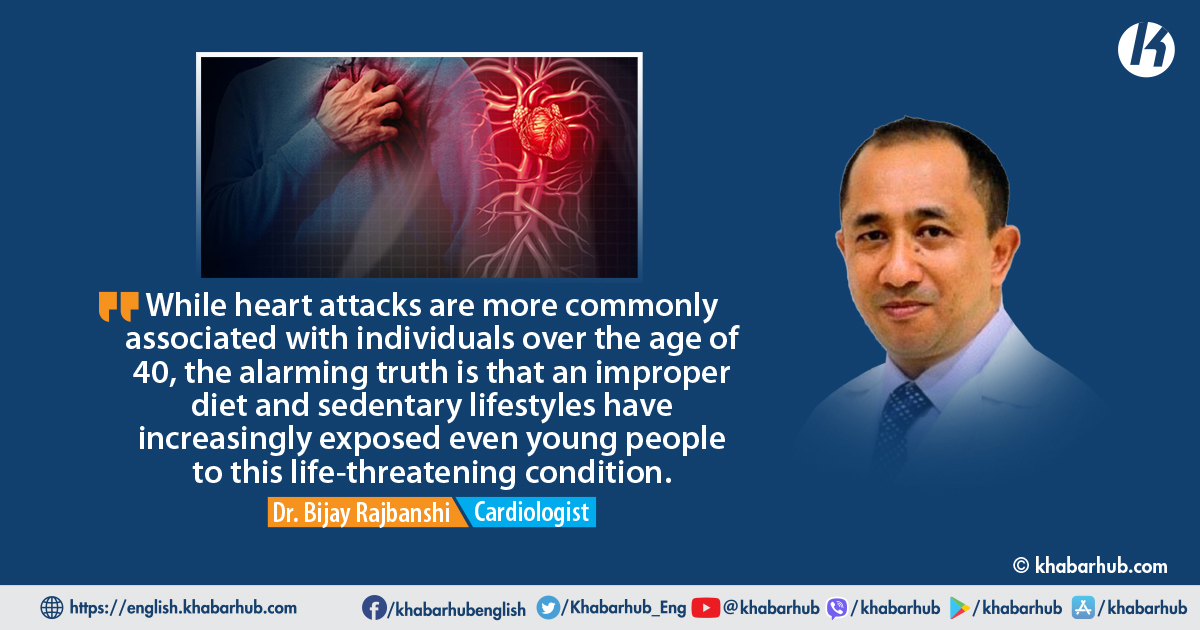KATHMANDU: In recent times, there has been a concerning rise in heart diseases, primarily attributed to changes in our daily lifestyles and unhealthy eating habits.
It is no secret that cardiovascular diseases, which encompass heart attacks and heart failure, have become the leading cause of human mortality.
A heart attack is a critical medical emergency that demands immediate hospitalization.
Failing to seek prompt medical attention in such cases significantly heightens the risk of fatality.
While heart attacks are more commonly associated with individuals over the age of 40, the alarming truth is that an improper diet and sedentary lifestyles have increasingly exposed even young people to this life-threatening condition.
Medical experts emphasize that even mild heart attack symptoms should not be taken lightly, as neglecting them can have fatal consequences.
So, what exactly is a heart attack? What are its warning signs, and how can one reduce the risk of experiencing one?
In an interview with Dr. Bijay Rajbanshi, a cardiologist, we delve into these critical questions to shed light on how to safeguard your heart health.
Why is the problem of heart attack increasing recently?
There are many causes of heart attack. Heart attacks can also be caused by certain genetic diseases.
This problem is seen more in men than in women due to hormones. Women have a lower risk of heart attack than men.
This can be caused by high blood pressure, diabetes, high blood cholesterol, and excessive alcohol consumption.
Can you sometimes not recognize that you’re having a heart attack?
Absolutely, it’s a common misconception. The symptoms of a heart attack can be subtle or intense.
They often manifest as a central chest pain, shortness of breath, and occasionally palpitations.
Other symptoms may include swelling in the legs, neck vessel enlargement, left-sided chest discomfort, sweating, and nausea.
If you experience any of these signs, seeking immediate medical attention is imperative. Home remedies won’t suffice; a heart attack demands professional care.
Is there an age when one should start monitoring heart health more closely?
Indeed, it’s wise to be proactive about heart health, especially after turning 40. Regular check-ups can help detect issues early and prevent serious complications.
Sadly, one-third of heart attack patients don’t make it to the hospital in time, so it’s crucial to take these precautions seriously.
Also, if you ever experience upper chest or abdominal pain, it’s important not to self-diagnose as gastric issues. Prompt evaluation is essential.
Is this problem hereditary?
Yes, heart problems can indeed run in families. So, if there’s a history of heart attacks in your family, it’s advisable for other family members to undergo periodic heart check-ups.
Additionally, individuals who cross the age of 40 should consider regular screenings for diabetes, high blood pressure, and other related conditions.
Who is more at risk of experiencing a heart attack?
The risk of a heart attack is significantly higher for individuals with chronic conditions like long-term high blood pressure, uncontrolled diabetes, and those who neglect their diabetes medication.
High cholesterol, sedentary lifestyles, imbalanced diets, excessive consumption of processed foods, and habits like smoking and excessive alcohol consumption also elevate the risk.
That’s why it’s crucial to pay attention to one’s lifestyle. A minimum of 120 minutes of weekly exercise is essential.
What has contributed to the recent surge in heart problems among the younger generation?
Many young people are now receiving early diagnoses, allowing them to address health concerns before they escalate.
However, a significant portion of heart attacks among the young generation, roughly 40%, can be attributed to factors like high blood pressure, diabetes, unhealthy lifestyles encompassing smoking, alcohol consumption, lack of regular exercise, and poor dietary habits.
What is the likelihood of a heart attack recurring after recovering from one?
The risk of recurrence is a possibility. It often involves blockages in the heart’s blood vessels, necessitating ongoing heart treatment, potential surgeries, and a lifelong medication regimen.
There’s no certainty that the issue is entirely resolved.
How is a heart attack treated after a patient arrives at the hospital?
When a patient arrives with symptoms of a heart attack, we conduct a comprehensive assessment, including heart rate monitoring, ECGs, and CT scans.
To identify blockages, we insert a wire through a blood vessel in the arm or leg. Treatment is tailored based on these findings.
What preventive measures should individuals take to reduce their risk of a heart attack?
Prevention is the key. It starts with a lifestyle overhaul. Aim for a minimum of 120 minutes of exercise per week.
After turning 40, regular check-ups for diabetes, high blood pressure, and other health markers are essential.
Avoiding excessive alcohol consumption, staying vigilant about any bodily changes, and maintaining a healthy diet rich in fruits and vegetables are all crucial steps to minimize the risk of heart problems.









Comment